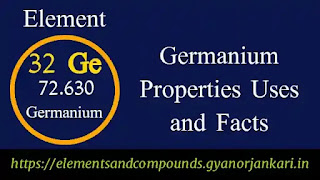Properties Uses and Facts about Germanium
What is Germanium
Germanium is classified as a metalloid, and chemically it is an element.
Metalloids are elements that show properties of both metals and non-metals.
The density of germanium is 5.323 grams per cubic centimeter. Germanium has
the symbol Ge, atomic number 32, and atomic mass 72.63 amu. There are 32
electrons, 32 protons, 41 neutrons and 4 energy levels in an atom of
germanium. In the Periodic Table, Germanium is located in Group 14, Period 4
and Block (P). Germanium is found in the solid state at room temperature,
its melting point is 938 °C (1720 °F), and its boiling point is 2833 °C
(5131 °F).
Germanium was discovered by the German chemist Clemens Winkler in
1886.

|
|
|
Properties of Germanium
- Germanium is a shiny silver-white substance that looks like a metal. It is hard and extremely brittle, and breaks easily, whereas metals do not break easily.
- Germanium is a semiconductor. Semiconductors are substances that conduct electricity better than non-conductors (such as wood, rubber, etc.), but conduct less electricity than conductors (such as silver, copper, iron, etc.).
- The structure of germanium is similar to that of diamond, and its chemical and physical properties are similar to those of silicon.
- Germanium is a chemically less reactive element, it does not react with oxygen at room temperature. It reacts with oxygen only at high temperature.
- Germanium is chemically more active in the form of powder.
- Germanium does not react with any acid except nitric acid.
- Germanium is one of the few elements that expands in volume on freezing.
- Germanium does not dissolve in water.
Uses of Germanium
- Germanium was most commonly used in the electronics industry in the form of transistors, but is now being replaced by other semiconductors.
- Today germanium is mostly used in the manufacture of fiber optic.
- Germanium and germanium oxide is transparent to infrared radiation, so it is used in infrared spectroscopes.
- Germanium is toxic to some bacteria, so studies are being conducted for its use in pharmaceuticals.
- Germanium is used to make wide angle lenses for cameras and lenses for microscopes.
- Germanium is used to make special glasses for military equipment used in the dark.
- Germanium is used to make special glasses for satellite systems and fire alarm systems.
- Germanium is used as a catalyst in the production of some types of plastics.
- 1% germanium is added to silver, due to which the luster of silver does not deteriorate with time.
- Germanium is used as a phosphor in fluorescent lamps.
Interesting facts about Germanium
- Germanium is the 55th most abundant element in the Earth's crust.
- Germanium hydrate and germanium tetrahydrate are highly flammable, and explode when mixed with air.
- The main ores of germanium are germanite and argyrodite. Both the main ores of germanium are extremely rare.
- Germanium is obtained as a byproduct during the production of zinc.
- We consume about 1 mg of germanium per day.
- Most of the Germanium is produced in the world in China.
Detailed Information on Some other Elements
- Gold Properties Uses and other Details
- Silver Properties Uses and Other Details
- Mercury Properties Uses and other Details
- Hydrogen Properties Uses and Other Details
- Platinum Properties Uses and other details
- Titanium Properties Uses and other Details
- Aluminium Properties Uses and other Details
- Copper Properties Uses and Other Details
- Iron Metal Properties Uses and Other Details
- Nickel Metal Properties Uses and other Details
- Plutonium | Properties | Uses | Other Details
- Uranium | Properties | Uses | Other Details
- Lithium | Properties | Uses | Other Details
- Thorium | Properties | Uses | Facts
- Radon Gas | Properties | Uses | Facts
- Potassium | Properties | Uses | Facts
- Beryllium | Properties | Uses | Facts
- Magnesium | Properties | Uses | Facts
- Calcium | Properties | Uses | Facts
- Strontium Metal | Properties | Uses | Facts
- Barium Element | Properties | Uses | Facts
- Silicon | Properties | Uses | and Facts
- Phosphorus | Properties | Uses | and Facts
- Sulfur | Properties | Uses | and Facts
- Selenium | Properties | Uses | and Facts
- Tin Metal | Properties | Uses | and Facts
- Lead Metal | Properties | Uses | and Facts






No comments:
Post a Comment